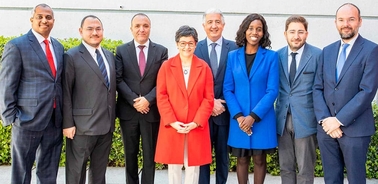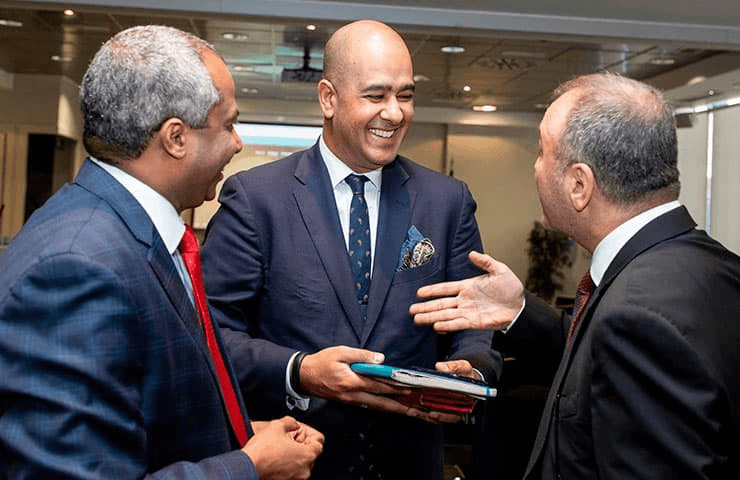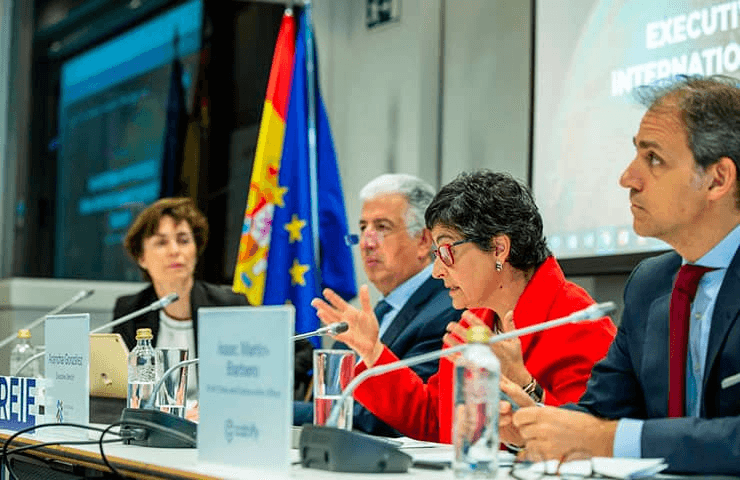- Home
- Ie School Of Global & Public Affairs Launches Executive Master In International Trade
IE School of Global & Public Affairs Launches Executive Master in International Trade

The IE School of Global and Public Affairs and the ITC, in collaboration with the ITFC, launched the Executive Master in International Trade.
The IE School of Global and Public Affairs and the International Trade Centre (ITC), a joint agency of the United Nations and the World Trade Organization, in collaboration with the International Islamic Trade Finance Corporation (ITFC) recently celebrated the launch of the Executive Master in International Trade. A unique example of a partnership between multilateral agencies and a top tier university, the blended format program will begin in March 2020, combining face-to face modules in Madrid and Geneva with live online sessions and interactive forums.
The event, Challenges of Global Trade and International Business Expansion, held on the IE campus in Madrid, featured a panel discussion with ITFC CEO, Hani Salem Sonbol; ITC Executive Director Arancha Gonzalez; and invited speaker Cabify Chief Cities & Communities Officer, Isaac Martin Barbero. Director of EsGlobal Cristina Manzano moderated the discussion.

“We launched the master degree in internationalization and trade to understand these two forces and study trade in its full dimension within geopolitics and economics, and at the intersection of technology,” said Dean Muniz.
The conversation that followed focused on the main challenges for trade today, and the impact of constant change on global governance, foreign investment, and growing inequalities.
There are three crises in international trade, commented ITC Executive Director Arancha Gonzalez. The first being that it is portrayed incorrectly as a zero-sum game. The second crisis is about how international trade is managed. “The best way to manage inter-relations is through multilateral discussions and agreements, but multilateral is now seen as a sign of weakness. And the third crisis is in the institution that represents multilateral trade, which is the World Trade Organization. It is advancing at a slower pace than the world around us and this creates the impression that the very institution charged with governing multilateral international trade is not responsive to the demands of the market.”
ITFC CEO Hani Salem Sonbol continued: “Trade during today’s geopolitical and economic challenges requires smooth channels and stable borders. We will need to reflect on how different Governments, MDBs, IFIs, regulators, academic community, entrepreneurs and SMEs, innovators and the banking community can work together to create a business and trade enabling environment.”

“Thirty years ago, when we said ‘IT,’ we were thinking about international trade and now when we say ‘IT’ today we are likely referring to informational technology. Both have come together,” said Martin Barbero. “We simply have no governance for what has already become, due to technology, fifteen percent of international trade. Thus, the effect of what we have today as the model of globalization is in itself undermining the whole governance system on which it was built.”
The new Executive Master in International Trade will prepare leaders for this multipolar world that tests multilateralism and the global trading architecture. It has been created with the following profiles in mind:
- Policymakers, government officials, and staff of international organizations working on issues related to trade and investment policy and regulation who aspire to foster economic development and lead their teams in this period of change;
- Senior managers and business owners interested in expanding their businesses to new international markets, with distinct cultures and regulatory environments;
- Trade professionals willing to advance their careers and adapt to the new forces that are reshaping global trade;
- Investors eager to understand challenges and promote more sustainable investment opportunities;
- Career shifters with creative mind-sets motivated to find new commercial opportunities in a connected world.
Hani Salem Sonbol commented, “Shaping up a program like the Executive Master in International Trade is an answer to the needs of the dynamic and evolving landscape of Trade and Trade Finance. Partnering with prominent institutions like IE and ITC in this Program provides a unique transformational experience that combines academic excellence and practitioners’ leadership with the aim to push the frontier of learning beyond conventional practices and assumptions to new horizons.”
Prospective students can find information about the application process here.